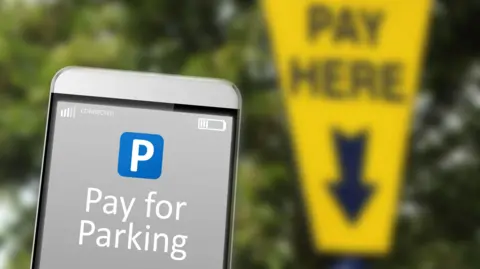'Five-minute fine' prompts private car parks review
 Getty Images
Getty ImagesPrivate parking firms have pledged to update their to rules to ensure motorists are not penalised if they do not pay to park within five minutes.
It comes after motorist Rosey Hudson was taken to court last year after accumulating £1,906 in fines for taking more than five minutes to pay for parking in Derby.
Ms Hudson was given 10 Parking Charge Notices in the space of several days after walking away from her car in order to find phone reception so she could use an app to pay for a space.
Now two industry bodies say they will revise their code of conduct to "protect genuine motorists" and "reflect technological advancements".
The British Parking Association (BPA) and the International Parking Community (IPC) have announced that a panel will revise the private parking sector's code of conduct to ensure it "protects genuine motorists who have difficulty making prompt payment on entry".
The BPA said a key priority will be to urgently review Ms Hudson's case, which has been called the five-minute payment rule.
It said that a revision to the code addressing payment difficulties would come into effect by February 2025 and the full review could be expected by the following April.
Ms Hudson was one of several people taken to court by private car park operator Excel Parking.
In December, Excel dropped its case against her without explanation, and did the same for Garry Kay, who parked at the same car park in Derby and was preparing to fight fines of £255.

In November, analysis of government data by the RAC Foundation found that private parking companies were issuing an average of 41,000 parking tickets per day.
Each ticket can be up to £100, meaning the maximum total daily income from fines to drivers would amount to £4.1m.
A bill to introduce a government-backed code of practice for private parking companies received royal assent in 2019 but it was withdrawn in June 2022 after a legal challenge by parking companies.
That code included a £50 cap on most fines, a grace period for lateness and a fairer appeals system.
In June, the BPA and IPC published their own code of practice which is what will be overseen by the new panel.
The move to introduce the panel shows that private parking firms are "serious about raising standards but also making decisive changes to the code when issues arise", BPA chief executive Andrew Pester said.
IPC chief executive Will Hurley said the panel "shows the commitment the industry has to improving the reputation of our sector".
